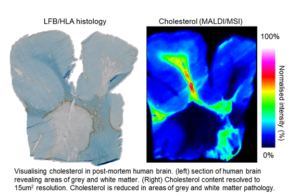Meet the Researcher: Lauren Griffiths
Lauren Griffiths is a Research Technician at Swansea University. Her recent research has centred around cholesterol, its function in the brain, and understanding its role in neurodegenerative diseases.
Cholesterol is an essential molecule in the body, and especially in the brain, where it is the most common lipid and is essential for cell membranes, including the myelin sheath (the fatty substance that allows nerve signals to move quickly).
The synthesis and metabolism of cholesterol are regulated by enzymatic reactions, but what happens when this process goes wrong and how does it impact brain function?
The research
That was the question I wanted to answer when beginning my PhD almost four years ago, where, as part of the team that developed a novel imaging technique that, paired with mass spectrometry, allows us to accurately map and measure cholesterol across intact brain tissue sections.
This method of mapping and measuring cholesterol in the brain was the first of its kind and has come at a really important time where interest has turned to how cholesterol, and its derivatives, play important roles in neurodegenerative diseases like Alzheimer’s, Parkinson’s, and Huntington’s.

We have recently applied our method of imaging cholesterol to human multiple sclerosis (MS) tissue and collaborated with the Brain Repair Group in Cardiff University (Prof Anne Rosser and Dr Mariah Lelos) to analyse cholesterol in the brain of Huntington’s disease (HD).
What next?
The next steps in our research journey with BRAIN are to analyse the cholesterol precursors and derivatives, the oxysterols, using another novel mass spectrometry technique. Oxysterols are important signals to protect neurons from dying and reduce brain inflammation.
One important oxysterol that we are now focussing on is 24S-hydroxycholesterol, which is linked to neuronal loss and when its synthesis is boosted can prevent neurodegeneration in animal models.




